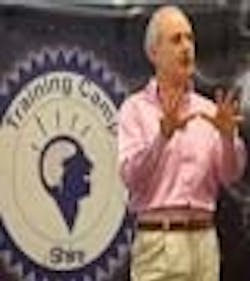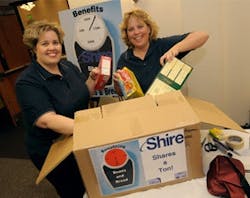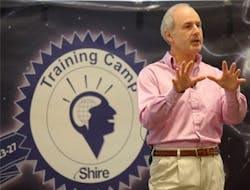Seemingly few parallels can be drawn between football and pharmaceutical manufacturing. Yet it was football, American-style, that provided the inspiration for an innovative training program developed at Shire Pharmaceuticals’ Owings Mills, Md. site.
It used to be that the site—which specializes in the manufacture of solid oral dosage drugs—would shut down for routine maintenance and repair for two weeks every summer. Employees took vacation time, whether they wanted to or not. Late in 2006, Bill Monteith, former plant manager, challenged his QA team—headed by Joe Homan, Senior Manager of Quality Assurance Training & Development, N-Neka Smith, Quality Assurance Training Supervisor, and Quality Assurance Training Manager Tracy Hickey—to come up with something different that could benefit employees during the annual plant shut down week. The QA team, to use a football metaphor, took the ball and ran with it.
“We’ll knock your socks off, Bill,” Homan told him, and the team huddled together to strategize how to best develop a training program that would appeal to and energize employees at all levels. The NFL’s Baltimore Ravens hold their annual pre-season training camp at nearby Stevenson College, and this provided the inspiration Homan and the others were looking for. After all, pro football teams held training camps for good reasons: to sharpen their individual and collective skills, establish camaraderie, and unite everyone under the same goals. “We are a team just like a professional sports team is a team,” Homan says. The Shire “coaching staff” set about designing our own “training” camp.
Kari Bothwell, Technical Trainer, and Pam Johnston, Sr. SQ Training Coordinator, help out with a food drive at camp.
There would be some 300 employees in need of training, but in a variety of topic and skill areas. For the camp’s structure, the organizing team looked to a typical college curriculum as a model: a mix of mandatory courses (such as those on GMP compliance, which served as the core of the program) and optional electives (computer training, life skills such as assertiveness, etc.), each in 45-minute sessions and taught by in-house experts and hired outside faculty. Employees would be mailed out schedules in advance of their mandatory offerings, and then work with immediate supervisors to assess their needs and to select elective classes.
The plant’s management team liked the idea and decided to adopt it for a weeklong program in the summer of 2007, held mainly at Stevenson University, adjacent to Shire’s campus. “At first, senior management was wondering how we’d pull this off, but once we showed them our full plans, they were on board,” says Homan. The goals of the proposal were firmly in line with what management sought: learning, team- and morale-building, networking, information-sharing, and professional development – all delivered in a fun, energized, team-oriented format. Homan also calculated that the cost of hiring a private firm to train such a large number of employees off-site would be roughly 11 times more expensive than the team’s proposal. The idea looked so promising that management decided to invite employees from Shire sites in the UK, Canada, and Massachusetts.
To round out the “camp” experience, trainees were given the chance to interact and participate in character- and team-building exercises and breakout and networking opportunities. The list of extracurricular activities grew from 2007 to 2008, and now include departmental get-togethers, a small Pittcon-like tradeshow of key vendors, an EH&S wellness fair, human resources information stations, a food drive that donated a ton of non-perishables to a local food bank, and even a “Shire Feud” game show and “Shire Idol” talent show.
Plenary sessions have featured talks by patients whose lives have been improved by the medications manufactured in Shire’s Owings Mills plant—namely, the anti-convulsant Carbatrol and Pentasa for ulcerative colitis. “In manufacturing, you can have people that might not feel as connected to the organization, because they’re not always at a workstation getting emails and other messages about the company’s products,” says Hickey. “This connected them to the organization in a different way.”
The training camp provided workers with several first-time opportunities, Homan and Hickey say. It was the first time many of them had ever gone off-site for training, and that aspect reinforced the importance of the event; secondly, it was the first time workers from Owings Mills’ three different shifts had a chance to really get to interact with each other; and, finally, it was their first chance to meet Shire colleagues outside of their own facility.
Shire CEO Angus Russell attends training camp.
A notable difference about the 2008 training was that executives were asked to participate. This was another first, with manufacturing-floor employees having the opportunity to meet and mingle with executive management, including Shire CEO Angus Russell. It wasn’t hard to convince top executives to participate, says Homan, since most had heard about the success of the 2007 event and wanted to join in 2008.
Unlike the win-or-lose world of football, there are many measures by which the success of a training program can be judged. Following the 2007 event, there were two clear signs that the training had worked. First, there was an immediate and significant drop in the number of investigations per batch within the entire facility. Just as important, there was a new atmosphere at Owings Mills. “The teamwork and harmonization across the site was palpable,” says Homan. “You could just feel it.”


